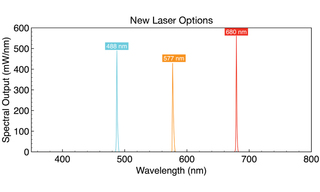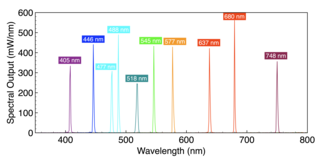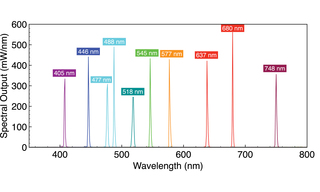More CELESTA and ZIVA Lasers for More Applications
Lumencor is excited to offer three new lasers within our CELESTA and ZIVA Light Engine offerings. Researchers using spinning disk confocal microscopy, super-resolution microscopy, spatially resolved transcriptomics and other advanced imaging applications will find the already formidable brightness, spectral breadth, stability, ease-of-use, offered by these two light engines are now even greater.

The new laser options are 488 nm, 577 nm, and 680 nm. They expand the scope of the CELESTA and ZIVA in imaging and other biophotonics applications in many ways:
- The new 488 nm laser is ideal for exciting GFP, FITC and Alexa Fluor 488 fluorophors. With this laser, users will be able to replicate the most prominent argon-ion laser line in tandem with six additional lasers.
- The 577 nm laser provides mCherry, Texas Red and Alexa Fluor 594 fluorophor excitation, as well as photodesensitization for the optogenetic inhibitor halorhodsin (NpHR). Using 577 nm light in combination with 446 nm and 518 nm lasers, readily supports 3-color fluorescent protein imaging with CFP, YFP and mCherry.
- The 680 nm laser addresses the increasing demand for near-infrared (nIR) fluorescence excitation. With this optional laser, you can excite nIR fluorophores such as Alexa Fluor 680 and IRDye 680.
We want you to get exactly the illumination you need for your application. These new lasers are each available in the many standard Light Engine configurations advertised as off-the-shelf products in our price lists, and also in customized configurations. Don’t need seven lasers? Lumencor offers four or five laser configurations in a CELESTA or ZIVA Quattro Light Engine. Simply chose only those lines of interest from the full range of standard and new laser options.

To help make full use of our range of new and existing lasers, Lumencor offers a custom penta-band and triple-band set of filters. These high optical density filter sets are matched to the laser center wavelengths and provide the best optical glass suitability for these laser Light Engine’s spectral output. For more information, including ASCII data for these products, please contact Lumencor’s Technical Support staff.
We look forward to hearing from customers about new applications for the CELESTA and ZIVA Light Engines, particularly those enabled by this expanded spectral range. For more information on the complete capabilities of these Light Engines, please see our updated CELESTA data sheet and ZIVA data sheet.



